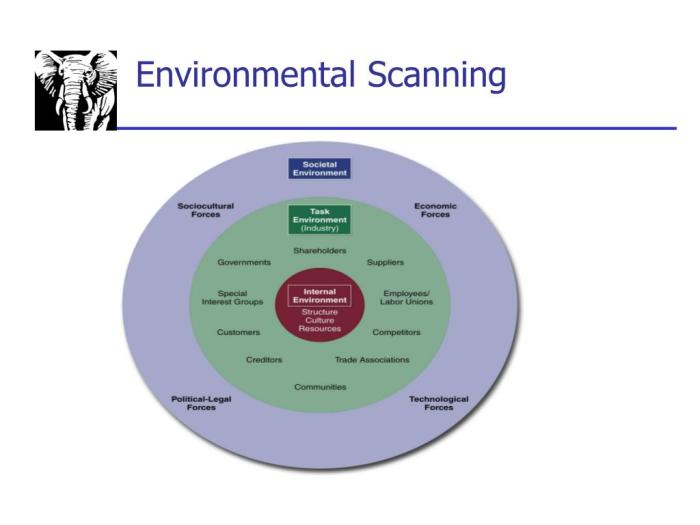With Environmental scanning in business strategy at the forefront, get ready to dive into the dynamic world of strategic decision-making and discover how businesses stay ahead of the curve. From uncovering hidden opportunities to predicting market trends, this topic is sure to spark your curiosity!
As we explore the concept of environmental scanning and its impact on business strategies, you’ll witness the power of informed decision-making and proactive planning in today’s competitive business environment.
Environmental scanning in business strategy
Environmental scanning is the process of monitoring and analyzing the external environment to identify potential opportunities and threats that can impact a company’s strategic decisions. By understanding the external factors that may affect the business, organizations can make informed choices to adapt and stay competitive in the market.
Examples of how environmental scanning can impact a company’s strategic decisions
- Market trends: By monitoring market trends such as changing consumer preferences or emerging technologies, a company can adjust its product offerings to meet the demands of the market.
- Competitive analysis: Analyzing competitors’ strategies and market positioning can help a company identify areas where they can differentiate themselves and gain a competitive advantage.
- Regulatory changes: Keeping track of changes in regulations and policies can help a company anticipate potential compliance issues and adjust their operations accordingly.
The importance of conducting environmental scanning regularly in a business setting
Regular environmental scanning is crucial for the success of a business as it allows organizations to stay proactive and responsive to changes in the external environment. Some key reasons why conducting environmental scanning regularly is important include:
- Identifying opportunities: By monitoring external factors, businesses can identify new opportunities for growth and expansion.
- Minimizing risks: Anticipating potential threats and risks allows companies to take proactive measures to mitigate them before they impact the business.
- Strategic planning: Environmental scanning provides valuable insights that inform strategic planning and decision-making, helping companies align their goals with market trends and changes.
Significance of Business Environment

Understanding the business environment is crucial for organizations as it provides valuable insights into the factors that can impact their operations and success.
Definition of Business Environment
The business environment refers to the external and internal factors that can influence a company’s operations and decisions. External factors include the economy, competition, technology, and legal regulations, while internal factors consist of company culture, resources, and leadership.
Importance of Understanding Business Environment
- Guides Strategic Decision-making: By analyzing the business environment, organizations can identify opportunities and threats, allowing them to develop strategies that align with market trends and customer needs.
- Risk Mitigation: Understanding the business environment helps in anticipating potential risks and challenges, enabling companies to proactively address them and minimize their impact.
- Enhances Competitiveness: Businesses that are aware of the business environment can stay ahead of competitors by adapting to changing market conditions and customer preferences.
Comparison of Internal and External Factors
| Internal Factors | External Factors |
|---|---|
| Controlled by the organization | Beyond the company’s control |
| Includes company culture, resources, and leadership | Consists of the economy, competition, technology, and legal regulations |
| Directly impact operations and decision-making | Influence the business environment indirectly |
Final Conclusion

In a nutshell, Environmental scanning in business strategy is the compass that guides companies through the ever-changing landscape of opportunities and threats. By understanding and adapting to the business environment, organizations can chart a course towards sustainable success in the long run.
Essential FAQs
How often should environmental scanning be conducted?
Environmental scanning should be done regularly to stay abreast of changes in the business environment and make timely strategic decisions.
What are some examples of external factors that can impact business strategy?
External factors like economic conditions, technological advancements, and regulatory changes can significantly influence a company’s strategic decisions.
How does understanding the business environment help in strategy development?
By understanding the business environment, companies can identify opportunities and threats, tailor their strategies accordingly, and gain a competitive edge in the market.